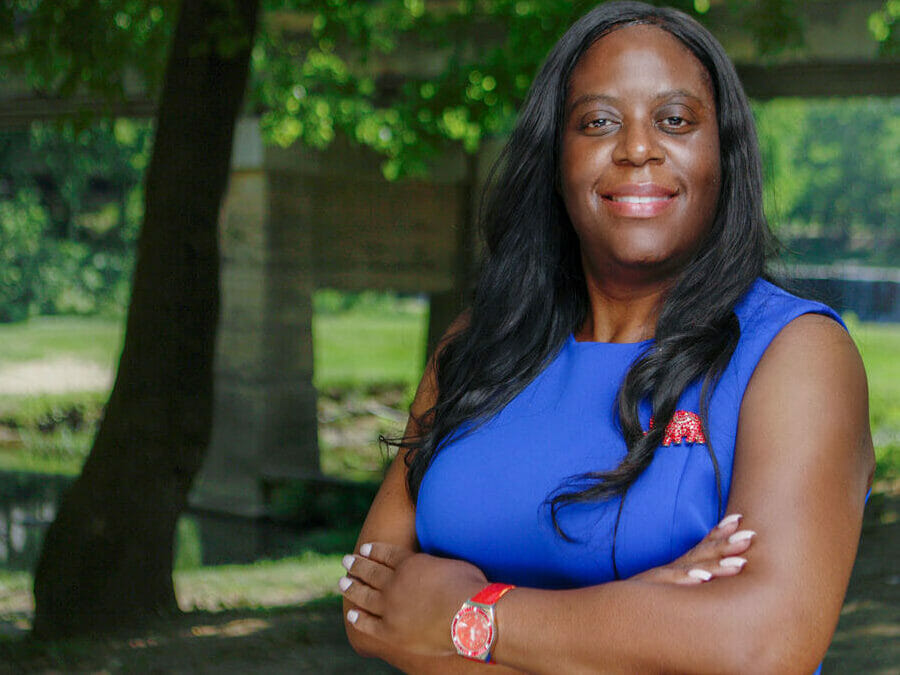July 6, 2020
If you’ve ever found yourself worrying endlessly about worst-case scenarios seemingly out of nowhere, you’re not alone.
Do any of the following sound familiar?
I don’t know if I did well on that test Im never going to graduate from college, how will I get a job?


I made a small mistake at work, and even though I was able to fix it and they said it was fine, I think my boss will fire me.
My husband is late on his way home, so he must have been horribly injured in a car crash.
For people with anxiety, thoughts like these may not be completely uncommon. When your anxiety meets an impressive imagination, catastrophic thinking can occur.
Catastrophic thinking is caused by anxiety, but it can also feed into the anxiety too, making your symptoms much worse.
In this post, were going to go over what catastrophic thinking is, why it happens, how to recognize it, and what you can do to keep it from taking over.
What Is Catastrophic Thinking Exactly?
Catastrophic thinking is an anxious behavior that results in us immediately asking ourselves whats the absolute worst thing that could happen and then worrying that it will come to pass. In many cases, this is a subconscious train of thought; we don’t realize were reaching for unlikely worse case scenarios, and instead can dwell on them.
Lets look at an example. Say that your spouse is late coming home from work. You don’t automatically say to yourself Well he had a big project, he probably got distracted. He’s’ only fifteen minutes late. Instead, your heart starts to race, and you wonder but what if he did get in a car crash and no one has called me yet? When would someone call me?
Catastrophic thinking can be a symptom of generalized anxiety or other anxiety disorders, but it also contributes to it. You’re feeding into the anxiety instead of learning how to manage it, which can trigger unhealthy behavior patterns that keep you stuck.
What Causes Catastrophic Thinking
The causes of catastrophic thinking can depend on the person, but the basic answer is often some sort of anxiety-related condition. This may include Obsessive Compulsive Disorder (OCD), which can cause obtrusive worrying about worst-case scenarios.
That being said, there are two common reasons that we end up going down the catastrophic thinking rabbit hole:
- We try to logic our way out of anxious feelings that we have.This is particularly common in individuals with high-achieving, high-functioning anxiety. They’re trying to address the symptom of an anxiety attack by reasoning their way out of it, thinking well how bad can it really get? They may do this to calm themselves, or to tell themselves if they know the worst-case scenario then they can prepare. Then, however, they manage to come up with the absolute worst-case scenario, which does nothing to help their anxiety.
- We have a deep-seated fear of failure that pops up.We might fear specific types of failure or loss, like the loss of a family member or failure causing us to get fired. If something triggers that fear, like a mistake at work, it can trigger worst-case scenario thinking.
How to Recognize Catastrophic Thinking
Catastrophic thinking can be difficult to recognize until you have a name for it.
When you’re experiencing anxiety, after all, catastrophic thoughts can seem like they’re ever-present and impending realities. In order to combat catastrophic thinking and to keep it in check, however, its helpful to recognize the thoughts for what they are.
These tips can typically help you do exactly that:
- Look for what-if statements.If you find yourself thinking along the lines of what if I get fired and lose my house and become homeless, or what if my head cold is actually a brain tumor and I die, notice that they’re starting with what if.What-if statements can often lead to catastrophic thinking, so if thats how the thought starts, flag it.
- Think about realistic and statistically probable outcomes.Unless your boss has a penchant for firing people over minor mistakes, for example, its extremely unlikely that you’d be fired for arriving late to one meeting or forgetting to respond to one email. If your coworker made the same mistake, would you assume they’d be fired? Probably not, and you’d probably think they were silly for worrying they would be.
- Consider the positive.Catastrophic thinking is literally all about focusing on the worst-case scenarios you can come up with. This leaves no room for the positive. If you aren’t even able to consider positive alternatives, that could indicate you’re stuck in a catastrophic thinking loop.
- Look for irrationality.Would you think its irrational if a friend brought you the same concerns that you’re worried about? And have you worried about this exact scenario before?
- Overthinking.If you find yourself trying to desperately prepare for how you’ll handle one of these ultimately bad worst-case scenarios and struggling to stop thinking about it, thats overthinking. This can be a classic sign of anxiety-driven catastrophic thinking.
How to Stop Catastrophic Thinking
There are three steps you can and should take to stop catastrophic thinking in its tracks.
- Recognize it for what it is.We looked at how to do this in the section above. If you’re unsure if you’re experiencing catastrophic thinking or not, an anxiety coach can help you look at your thought patterns to decipher catastrophic thinking.
- Focus on the positive.Intentionally think about more realistic or even best-case scenarios. Maybe instead of firing you, your boss will like that you took accountability for a mistake and worked to rectify it quickly, and they’ll respect you more.
- Stop dwelling.Racing and obsessive thoughts are no good, and you don’t want to feed the anxiety until it becomes overwhelming. If theres nothing you can do about your current situation, trying to think your way out of it wont help. Let yourself worry for a moment, and then move on with something distracting. Mindfulness can be particularly useful here.
Get seven stress and relaxation affirmations that you can use to start feeling calmer and more relaxed today – 7 Stress & Relaxation Affirmations
Conclusion
Catastrophic thinking is nothing to be ashamed of; in some families, its even normalized. One client I worked with years ago would never talk on the phone if anyone in the family was out, in case they got into an accident and tried to call. Because thats how she was raised. When catastrophic thinking is normalized (either through external forces like family or internally through your own consistent though behaviors), it can be difficult to identify and tackle.
Group accountability can be particularly beneficial here. You can talk to members of your group who have experienced anxiety themselves and who will offer positive, nonjudgmental feedback. An anxiety coach can also be key, helping you assess whats rational and whats irrational, giving you support and helping you to learn other resilience and management skills.
Are you struggling with anxiety in your career? I can help! I offer a 30-Minute consultation for anxiety, which is a personalized consultation session that will help you identify the cause of your anxiety and develop a plan to manage it. You may interested in our Panic to Power & Prosper: Push past anxiety to progression in 3 months (without years long therapy appointments) 3-month coaching program. To learn more, click and 👉🏾 request a free consultation.
Catastrophic thinking can run away with your anxiety until you put a stop to it. Book a consultation today to learn more about how we can stop it in its tracks.


If you found this article informative, consider buying me a cup of coffee here☕✨
Curated Reads: Essential Books to Add to Your Personal Library
- Melaninated Magic: 180 Affirmations to Nurture Your Soul and Unleash Your Black Girl Joy by Twanna Carter, PhD
- “I’m Not Yelling: A Black Woman’s Guide to Navigating the Workplace (Successful Black Business Women)“, Elizabeth Leiba.
- “Crucial Conversations: Tools for Talking When Stakes Are High” by Kerry Patterson, Joseph Grenny, Ron McMillan, and Al Switzler.
- “Influence: The Psychology of Persuasion” by Robert B. Cialdini.
- “How to Win Friends and Influence People” by Dale Carnegie.
- “Lean In: Women, Work, and the Will to Lead” by Sheryl Sandberg.
- “Dare to Lead” by Brene Brown.
- “The Memo“, by Minda Harts.
- “Atomic Habits: An Easy & Proven Way to Build Good Habits & Break Bad Ones“, by James Clear
- “Worthy: How to Believe You Are Enough and Transform Your Life“, by Jamie Kern Lima
Read my latest blogs…
- Are You Really Being Too Much, Or Just Being Seen?Have you ever felt the need to shrink yourself at work or in social spaces, just to avoid being labeled as “being too… Read more: Are You Really Being Too Much, Or Just Being Seen?
- Career Shift? These 9 Transferable Skills Resources Are Game-ChangersAs an executive-level professional aiming for a strategic career pivot, knowing your transferable skills isn’t just beneficial, it’s essential. Transferable skills are abilities… Read more: Career Shift? These 9 Transferable Skills Resources Are Game-Changers
- You Need a Hustle Detox. Not Another Planner.Are you tired of buying yet another planner, hoping THIS one will finally fix your chaos? You know the drill: glossy cover, color-coded… Read more: You Need a Hustle Detox. Not Another Planner.
- The 5 Core Values Every Black Woman Executive Should Define Before Her Next Career MoveHave you ever felt overwhelmed by opportunities, yet unsure which path truly fits your ambitions, identity, and well-being? If you’re a Black woman… Read more: The 5 Core Values Every Black Woman Executive Should Define Before Her Next Career Move
- How to Protect Yourself from Being Managed Out – The Ultimate Survival Playbook for Black Women ExecutivesYou walk into the Monday morning meeting, coffee in hand, feeling ready to tackle the week. But something’s off. The room feels… Read more: How to Protect Yourself from Being Managed Out – The Ultimate Survival Playbook for Black Women Executives
- What Your Inner Critic Is Really Costing You. And How to Take Back ControlHave you ever replayed a single mistake in your mind for days, doubted your abilities before a big meeting, or hesitated to ask… Read more: What Your Inner Critic Is Really Costing You. And How to Take Back Control
- Why Black Women Execs Doubt Their Voice (and How to Reclaim Your Power)And it starts now. If you’re ready to reclaim your voice, you don’t have to do it alone. Schedule your V.I.P. Roadmap Session… Read more: Why Black Women Execs Doubt Their Voice (and How to Reclaim Your Power)
- The Trauma Behind the Mask: Why I Walked Away from My Six-Figure JobI didn’t leave my job because I was unqualified. I didn’t leave because I couldn’t handle the work. They began managing me out.… Read more: The Trauma Behind the Mask: Why I Walked Away from My Six-Figure Job
- Stop Overgiving. Because It’s a Silent Career Killer for High-Achieving WomenYou’re smart. Capable. The one everyone counts on. From boardrooms to family rooms, you handle it all with grace. But beneath the surface,… Read more: Stop Overgiving. Because It’s a Silent Career Killer for High-Achieving Women
- You Feel Empty at Work, But Everyone Needs YouFor Black Women Who Keep Performing. Even When the Tank Is Empty Let’s keep it real for a moment, how many times do… Read more: You Feel Empty at Work, But Everyone Needs You
- 🔍 5 Signs It’s Time to Change Careers (And What to Do About It)Have you ever sat in a leadership meeting and thought, “I’ve outgrown this version of myself”?Maybe your calendar is full, your inbox is… Read more: 🔍 5 Signs It’s Time to Change Careers (And What to Do About It)
- Let Go of the Cape! Why You Don’t Have to Be Superwoman to Be SuccessfulIf you’re the go-to person at work, the fixer in your family, the one who makes it all look easy, this is for… Read more: Let Go of the Cape! Why You Don’t Have to Be Superwoman to Be Successful






















+ show Comments
- Hide Comments
add a comment